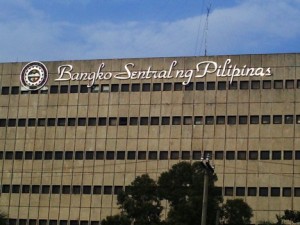MANILA, Philippines—Loans extended by the Bangko Sentral ng Pilipinas under its rediscounting facility dropped in the first five months of the year although the interest rate charged by the BSP remained at a record low.
According to the BSP, loans extended under the rediscounting facility went down by 11.9 percent to P14.62 billion in January to May this year from P16.61 billion in the same period last year.
Demand for rediscounted loans declined as the banking industry remained highly liquid and adequately capitalized during the period.
The BSP earlier said the combined resources of banks in the country amounted to P8.23 trillion as of the end of February, up year on year by 9 percent from P7.54 trillion.
The BSP charges an annual interest rate of 3.5 percent for loans extended under the rediscounting facility, or the same as the central bank’s overnight borrowing rate.
The rediscounting facility is intended to help banks keep their lending businesses operational, especially at times when they are burdened with huge receivables.
Loans extended under this facility represent the discounted value of the collateral, which are the collectibles of the borrowing banks.
Despite the year-on-year drop in the rediscounting loans, the amount remains significant.
The BSP said banks continued to avail themselves of loans from the central bank to boost their lending operations.
The banking industry expects its total loan portfolio to grow by between 10 and 15 percent this year from the levels in 2012.
Bank lending is credited for helping fuel the economy’s growth, which last year reached 6.8 percent, one of the fastest in Asia. The economy grew by 7.8 percent in the first quarter of 2013.
The BSP believes the Philippine banking industry will remain sound and stable despite the lingering uncertainties in the global economy.
It noted that capitalization levels of banks in the Philippines were higher than regulatory standards. The average capital adequacy ratio of universal and commercial banks in the country stands at about 17 percent, exceeding the 10 percent CAR requirement.



